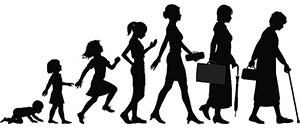When Do You Know Everything?
 You’re 18; you’re finally an adult; you think you know everything. You’ve graduated from high school (which
was probably the hardest thing you will ever have to go through), and you’ve reached
the moment that you’ve always dreamt of: adulthood. Now you can live your dream life,
and you will finally be happy…
You’re 18; you’re finally an adult; you think you know everything. You’ve graduated from high school (which
was probably the hardest thing you will ever have to go through), and you’ve reached
the moment that you’ve always dreamt of: adulthood. Now you can live your dream life,
and you will finally be happy…
Right?
If you’re even a day over 18, you know that this idea of achieving happiness by being an adult doesn’t last very long. How many times have you heard an adult say “adulting is hard” or “I hate adulting.” Once you’re an adult, you look back at your childhood with fondness and think “little did I know how free I actually was as a child.” The grass is always greener when you don’t have any foresight.
As I approach the end of my undergraduate degree 6 years later, I find myself falling into the habit of thinking the same thing that I did when I was 18: now that I’ve graduated from college, I can finally start living the life that I want to live. My world view has expanded, and I’ve gained all of the knowledge in the world, especially about families and relationships, as my degree is in Family Studies. My relationships should be perfect; I’ll get married in no time; I’ll never have conflict in any of my relationships ever again; I’ll help everyone in the world have healthy communication skills and parenting tactics, and I’ll be able to solve all of the world’s problems…
Right?
However, this semester I learned that even as a 24 year old, I don’t actually know everything. Imagine that! And no class taught me this more than my Adult Development and Aging class. I realized that there are so many things that we go through later in life that I hadn’t even begun to think about or wrap my head around.
 For example, I learned that hearing loss, which most older adults experience at some
point, causes older adults to withdraw from social situations. This explains why my
grandpa sometimes has a hard time engaging in our dinner table conversations, or why
I’ve noticed some older adults sit out of many conversations and simply observe. I
also learned that when spending time with people with dementia, the most helpful way
to communicate with them isn’t to orient them with reality, but rather it is to validate
their emotions even if they stem from a false reality. I have a brother with a disability,
and he also struggles with emotions that stem from a false reality, so this felt like
a light-bulb moment for me. These little bits of information helped me to better understand
the older adults in my life, widen my circle of exposure, and mentally prepare myself
for aging and assisting those around me. Why hadn’t I heard any of this information
before?
For example, I learned that hearing loss, which most older adults experience at some
point, causes older adults to withdraw from social situations. This explains why my
grandpa sometimes has a hard time engaging in our dinner table conversations, or why
I’ve noticed some older adults sit out of many conversations and simply observe. I
also learned that when spending time with people with dementia, the most helpful way
to communicate with them isn’t to orient them with reality, but rather it is to validate
their emotions even if they stem from a false reality. I have a brother with a disability,
and he also struggles with emotions that stem from a false reality, so this felt like
a light-bulb moment for me. These little bits of information helped me to better understand
the older adults in my life, widen my circle of exposure, and mentally prepare myself
for aging and assisting those around me. Why hadn’t I heard any of this information
before?
Aging has become somewhat of a taboo topic, which is baffling to me considering that aging is something that we all experience. When we ask people over 25 how old they are, they often jokingly brush off the question, and some even joke about celebrating their 29th birthday for 50 years in a row, never wanting to disclose their true age. Making aging a taboo topic does all of us a disservice, because it doesn’t allow us to celebrate the wisdom and power that comes with aging, or help us understand the aging process and how we can cope or thrive while aging. It also kills conversation about anything relating to aging, which are conversations that we all need to be having.
 We all have more to learn, and the best way to do that is to ask each other about
our human experiences. Asking the hard questions. Asking the awkward questions. Asking
the honest questions. Asking people about their experience with aging can start an
informative and healing conversation for all parties involved. We can expand each
other’s view of the world, and in the process we can recognize that we all have so
much to learn from each other.
We all have more to learn, and the best way to do that is to ask each other about
our human experiences. Asking the hard questions. Asking the awkward questions. Asking
the honest questions. Asking people about their experience with aging can start an
informative and healing conversation for all parties involved. We can expand each
other’s view of the world, and in the process we can recognize that we all have so
much to learn from each other.
The moral of the story: have a conversation with an older adult in your life. And if you are an older adult, don’t be afraid to talk about your experience with aging. You might be surprised at how many people haven’t had the chance to tell their story - and how many people are longing for someone to ask them a hard, honest, and even seemingly awkward question about aging so that they can share their true thoughts and their genuine story.
You could always start by asking “at what age did you realize that you knew everything?” Let me know what you find out. I’m assuming it’s not age 24.
